|

Space Moot Court Team Wins World Finals | DV LEAP Announces First Staff Attorney | The Conflict Between Facts and Values | Fifth Annual Cohen & Cohen Mock Trial Competition Showcases Student Talent | GW Law Tackles Criminal Justice Issues | Dean Lawrence and GW Law Honored With Civil Rights Award | Miriam’s Kitchen Service Project | International
Update | Faculty
File | New Faculty | GW
Law in History
Space Moot Court Team Wins World Finals
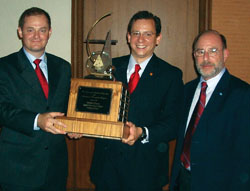
David “D.J.” Western, LLM ’07, and Magin Puig Monsen, JD ’06, won the 2007 Space Law World Championship in India this September. Here, they share the win with GW research professor and team coach Henry Hertzfeld during an International Institute of Space banquet.
|

|
The GW Law team of David “D.J.” Western, LLM ’07, and Magin Puig Monsen, JD ’06, LLM ’07, won the world championship of the Manfred Lachs Space Law Moot Court Competition in Hyderabad, India, by defeating the University of Leiden-the Netherlands in the semifinal and the University of Queensland-Australia in the final. For the championship, they argued before three members of the International Court of Justice.
Western and Monsen advanced to the World Championship by winning every award last spring at the North America Space Law Competition: best team, best brief, and best oralist (Western).
The team is a joint effort between the Law School and the Space Policy Institute at the GW Elliott School of International Affairs. David Johnson, senior assistant dean for student affairs and director of advocacy programs, recruits the team. The students are then coached by Henry Hertzfeld, research professor at the Center for International Science and Technology Policy/Space Policy Institute at the Elliott School. GW Law Professor Ralph Steinhardt also helped moot the team.
This is the third time GW Law has won the Manfred Lachs Trophy. Most recently, Kristie Blasé, JD ’06, and Olivia Hussey, JD ’05, placed first in a field of 50 teams in Fukuoka, Japan, at the 2005 competition. In 1992, GW Law boasted both the first- and second-place teams in the competition’s inaugural year, held in Washington, D.C., at Georgetown University. Stanimir A. Alexandrov, LLM ’93, SJD ’95, and Tod H. Cohen, JD ’92, won the competition, and classmates Steven R. Hawk, JD ’93, and Peter Borys, JD ’93, were the runners up. GW Law also placed second in 1993 in Graz, Austria, with a team made up of Guy Christiansen, JD ’93; Eric Edmondson, JD ’93; and Charles Hildebrandt, JD ’93.
|
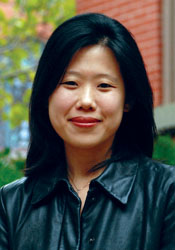
Elizabeth Liu is the new staff attorney of the Domestic Violence Legal Empowerment and Appeals Project.
Claire Duggan
|
DV LEAP Announces First Staff Attorney
The Domestic Violence Legal Empowerment and Appeals Project (DV LEAP) has welcomed its first staff attorney. Elizabeth Liu is a Harvard Law graduate and recent Women’s Law and Public Policy Fellow at Georgetown Law Center, where she co-taught the Domestic Violence Clinic. Her experience also includes presiding over the Board of Directors of the Asian/Pacific Islander Domestic Violence Resource Project.
“Having a staff attorney with such energy, enthusiasm, intelligence, and passion as Elizabeth possesses has been a godsend and is just what DV LEAP needs,” says Professor of Clinical Law Joan S. Meier.
Liu will focus on DV LEAP’s Criminal Justice Project and Rights Litigation Project, as well as monitor state court litigation in the wake of the recent Supreme Court cases. When possible, she is working on custody/abuse work and appeals.
“I am thrilled to be part of DV LEAP’s unique efforts to advocate for the rights of battered women and their children in appellate courts,” Liu says. “In my short time here, I have already been working on two custody and abuse cases and have found the work to be rewarding and intellectually engaging.”
DV LEAP has taken off in the past six months. The project achieved a huge appellate victory on behalf of abused children in custody litigation, launched its own series of trainings and symposia on custody and abuse, launched a Web site, and is already working on the next phase of strategic planning.
“GW’s support and partnership has been an indispensable part of this picture, and we are very grateful,” Meier says.
In addition to a heavy DV LEAP workload, Meier and Liu have been busy planning a December symposium that addresses bringing custody and abuse cases before the U.S. Supreme Court. The first-of-its-kind symposium on Dec. 7 and 8 will bring together Supreme Court scholars and litigators with domestic violence and child custody experts to create a set of best practices for bringing these due process violations for redress to the High Court. |
The Conflict Between Facts and Values
Law professor explores cultural dispositions in decision making
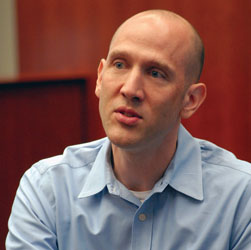
Professor Donald Braman and other scholars researched how cultural values influence our risk perceptions and policy beliefs. They discussed their findings of the Cultural Cognition Project during a presentation at GW Law in September. Learn more about the project at http://research.yale.edu/culturalcognition/.
Jessica McConnell
|

|
Americans have differing views on everything from gun control, to domestic terrorism, to global warming. But scholars say we don’t base these positions solely on facts.
In a study released in September, GW Law Professor Donald Braman, Yale Law Professor Dan Kahan, and other research scholars say that our cultural values and the leaders we perceive as having similar cultural values play major roles in how we react to societal risks.
This psychological tendency, called “cultural cognition,” allows individuals to credit or dismiss information depending on whether it supports or threatens one’s cultural perceptions, the researchers say.
“There is a culture war in America, but it’s not about what people normally think,” says Kahan, the Elizabeth K. Dollard Professor of Law at Yale Law School. “The vast majority of Americans agree government should avoid imposing one group’s cultural values on others. But people with different cultural outlooks strongly disagree with each other about societal risks and what to do about them.” The culture war in the country, he concludes, revolves around facts, not values.
Braman and Kahan explained their findings in the presentation, “The Second National Risk and Culture Study: Making Sense of, and Making Progress in, the American Culture War of Fact,” at GW Law School’s Jacob Burns Moot Court Room on Sept. 27. Funded in part by the National Science Foundation, the Cultural Cognition Project at Yale Law School explores how cultural values influence risk perceptions and policy beliefs, and how a society could reconcile its cultural differences.
To conduct the study, the researchers surveyed nearly 5,000 Americans about polarizing issues, such as whether stricter gun control is needed to avoid school shootings like the tragedy at Virginia Tech.
They found that participants responded to the facts of the issue in a way that reflected their own cultural disposition. And when shown resumes and photos of fictional “experts” (or culturally identifiable advocates) who had opinions on the issue, the participants’ responses remained in line with the “expert” who shared their values.
“It turns out that the fit between the values of the subjects and the perceived values of the advocates making these arguments has a big impact,” Kahan says. “People in effect construe information in a biased way. They selectively credit it or discredit it depending on whether it will affirm their values or threaten their values.”
These findings can be used to structure risk communication and policymaking, with a goal of neutralizing the tendency of people to polarize along cultural lines, the researchers say.
But Braman maintains that it can be difficult for people to acknowledge that they may have a bias related to their personal values.
“There’s a phenomenon called naïve realism, which says that you can see the bias in everyone else, especially when the bias is pointed in the other direction,” Braman says. “It’s much harder to see it in ourselves.”
—Jaime Ciavarra

Fifth Annual Cohen & Cohen Mock Trial Competition Showcases Student Talent
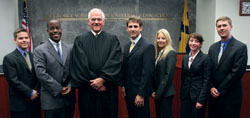
2Ls Patrick DeKlotz and Ryan Sanders, for the defense; U.S. District Judge James Robertson, LLB ’65; event sponsors Wayne Cohen and Jill Cohen; and 2Ls Dawna Anderson and Michael Williams, for the plaintiff
Abdul El-Tayef
|

|
Four GW Law 2Ls showcased their talents and the strength of the Mock Trial Board at the finals round of the 5th Annual Cohen & Cohen Mock Trial Competition, held in the Jacob Burns Moot Court Room Nov. 7. Dawna Anderson and Michael Williams represented the plaintiff for the fictitious case, with Patrick DeKlotz and Ryan Sanders arguing for the defense. U.S. District Judge James Robertson, LLB ’65, ruled in favor of the plaintiff but said the decision was difficult because all four students were “terrific” competitors.
The final arguments in O’Callahan v. National Television Network Studios, Inc., et al —a civil personal injury case involving questions of negligence and comparative negligence—were the culmination of three weeks of competition at the Law School.
A field of 22 teams was narrowed to two teams through preliminary, quarterfinal, and semifinal competitions. In their opening remarks, Senior Associate Dean for Academic Affairs Steve Schooner and Senior Assistant Dean for Student Affairs David Johnson praised all the competitors and the members of the Mock Trial Board for their skill and participation.
In addition to complimenting the competitors on their arguments and presentation, Robertson also recognized event sponsors professorial lecturer of law Wayne Cohen and Jill Cohen, manager and partner, respectively, of Cohen & Cohen, a personal injury firm in Washington, D.C. “The initiative you’ve taken in sponsoring this event is fantastic; it will improve the barrister class in our city,” Robertson said to the Cohens.
“It was a wonderful event. All four students were amazing—I would hire all four,” Wayne Cohen said. “It was a very close competition.”

GW Law Tackles Criminal Justice Issues
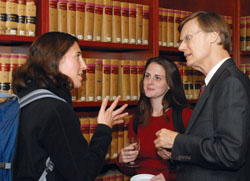
1L Jill Paul (left) and a friend speak with Steve Bright at a reception after the event. Paul is the niece of James H. Shulman, JD ’71, whose foundation generously sponsors the Shulman Lecture.
Claire Duggan
|

|
The fall semester brought many opportunities for GW Law students to hear from dedicated attorneys, activists, and policymakers about major issues affecting the criminal justice system and how we can make it more equitable for all, especially the poorest among us.
Crack/Powder Cocaine Disparity Panel
On Oct. 3, the Criminal Justice Reform Project organized a panel discussion on sentencing disparities found in our federal drug laws. “It’s Not Fair, It’s Not Working: The Crack/Powder Cocaine Disparity and Racial Inequality in the Criminal Justice System” packed the Student Conference Center. More than 100 students attended the discussion to hear more about how under our current laws, 500 grams of powder cocaine and five grams of crack cocaine result in the same five-year federal prison sentence.
“I couldn’t have been happier with the event as I’ve rarely seen as large and enthusiastic a crowd, and I heard from many students afterwards who said it reaffirmed their interest in both public interest law and in working to reduce racial inequality in the criminal justice system,” says event organizer 3L Leah Kane, president of CJRP. “The panelists did an excellent job of bringing the law to life, and Professor Paul Butler, the event moderator, did a fantastic job of bringing out all the issues in a thoughtful and thought-provoking way.”

|
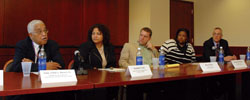
(From left to right) Judge Arthur L. Burnett Sr., national executive director, National African American Drug Policy Coalition; Jasmine Tyler, deputy director of national affairs, Drug Policy Alliance; Ryan King, policy analyst, The Sentencing Project; Jesselyn McCurdy, legislative counsel, American Civil Liberties Union; Eric Sterling, president, Criminal Justice Policy Foundation.
Claire Duggan
|
The event was co-sponsored by the Criminal Law Society and Black Law Student Association.
Shulman Foundation Lecture: Stephen B. Bright
The annual Shulman Foundation Lecture brought students and faculty together to hear from civil rights attorney Stephen B. Bright, a man who has dedicated his career to fighting for the rights of others.
Bright, founder and president of the Southern Center for Human Rights, presented the lecture “Life, Death and the Pursuit of Justice” on Oct. 31.
“Stephen Bright has literally saved lives and exposed injustices through the nonprofit law firm he founded and has truly shown what it means to be devoted to upholding justice in our society,” Associate Dean for Clinical Affairs Phyllis Goldfarb said during the introduction.

|
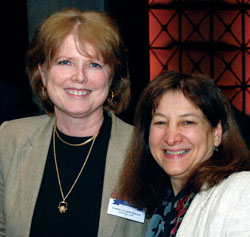
Dean Goldfarb (right) congratulates Carol Elder Bruce, JD ’74, one of evening’s honored attorneys at the Southern Center for Human Rights Douglass Awards Gala.
Claire Duggan
|
Bright told stories and lessons learned from his four decades working in legal aid, indigent defense, and death penalty work. He spoke of the economic divide and challenged the audience to admit that the poor don’t get the same treatment. He urged audience members to work to remedy that fact.
The death penalty is a major part of Bright’s work. “The death penalty is as great a degradation as you can imagine and is especially degrading to society,” he said. “This tells us what kind of society we are. But what kind of society do we want to be?”
Bright ended his speech by calling on law students to always think about ways to make a difference and to bring justice to those who might not otherwise obtain it.
Southern Center for Human Rights Douglass Awards Gala
The day after the Shulman Lecture, Steve Bright and his law firm, the Southern Center for Human Rights, honored more than 50 attorneys for their work with Guantánamo detainees at the firm’s annual gala and awards dinner. GW alumna Carol Elder Bruce, JD ’74, was one of those honored with the center’s prestigious Frederick Douglass Human Rights Award for her dedication to “safeguarding the fundamental human rights of persons detained at Guantánamo Bay.”
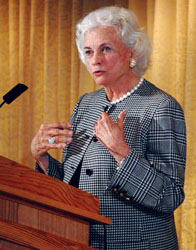
Sandra Day O’Connor gave the keynote speech at a November conference relating to the Supreme Court’s 1984 decision in Strickland v. Whashington.
Claire Duggan
|

|
Many GW Law faculty and students attended the inspirational event that culminated with a powerful speech by New York Times columnist Bob Herbert calling people to right injustices, help the impoverished become empowered, and finish what was begun with the Civil Rights movement.
Strickland v. Washington: How Effective is the Right to the Effective Assistance of Counsel Standard?
GW Law co-hosted a daylong conference that brought together attorneys, prosecutors, public defenders, lawmakers, policymakers, journalists, and civil rights experts to discuss the issue of the right to effective assistance of counsel and the Supreme Court’s 1984 decision in Strickland v. Washington. The event’s keynote speaker was Associate Justice of the U. S. Supreme Court (ret.) Sandra Day O’Connor, author of the majority opinion in Strickland. The event was organized by Virginia Sloan, president of The Constitution Project. The Library of Congress will have a Webcast of the conference; please check the GW Law Web site for a link to the video.
ABA Criminal Justice Section “Ethics and Professionalism in Plea Negotiations: Best Practices and Worst Pitfalls”

|
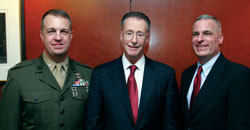
Lt. Col. Stuart Couch, Professor Stephen Saltzburg, and Col. Dwight H. Sullivan. Col. Sullivan is now a civilian lawyer working for the Air Force in death penalty defense appellate work.
|
The American Bar Association’s Criminal Justice Section held its fall conference at GW on Nov. 2 to discuss the best practices of plea negotiations. GW Law Professor Stephen Saltzburg, the section’s chair, hosted the event, and Professor Paul Butler served on one of the panels.
At a reception following the panels, GW Law LLM student Lt. Col. Stuart Couch was presented with the Minister of Justice Award for his work defending Guantánamo detainees. The Charles English Award was also given to Judge Advocate General attorneys for their work as counsel to the detainees.
Enrichment Lecture: Victor Garo
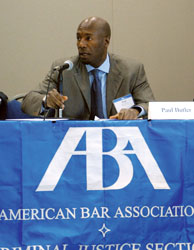
Professor Paul Butler sat on the “Best and Worst Negotiating Practices” panel.
Claire Duggan
|

|
The last Enrichment Lecture of the term, “A Matter of Conviction,” was delivered by Victor Garo, an attorney known for his passion for human rights and his dedication to pro bono work.
Garo spoke to students and faculty in the Tasher Great Room about his most notorious case: the case of Joseph Salvati, a man who spent more than 30 years in prison for a murder he did not commit. Garo dedicated more than 30,000 hours of pro bono legal help over three decades for Salvati.
Garo not only proved Salvati’s innocence but was successful in proving the FBI had helped frame him and another defendant in order to protect other informants. For their mistakes, the government was ordered to pay a record $101.7 million after a civil trial in which U.S. District Judge Nancy Gertner wrote, “It took 30 years to uncover this injustice. This case is about intentional conduct... the framing of innocent men.”
“Victor reminds us all of our solemn obligation to pursue the truth, even against the greatest of odds,” says Associate Dean Susan Karamanian.

|
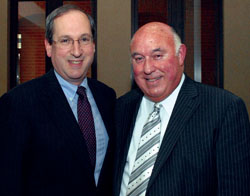
Dean Lawrence and Victor Garo
Claire Duggan
|
“Man’s inhumanity to man,” Garo told the crowded room several times during his speech. It was a theme he wanted to get across to the students, with the added guidance that they work hard to help correct these injustices.
Garo helped Salvati for free for all those long years because he believed in him and wanted to fight what the government had done to him and his loved ones. “It was more important for the FBI to protect their informants than to protect a young man and his family,” Garo said.
“Just because a client isn’t born into power doesn’t mean the government can take away their freedoms and rights,” Garo said. “As lawyers, we need to protect these people and their rights.”

Dean Lawrence and GW Law Honored With Civil Rights Award
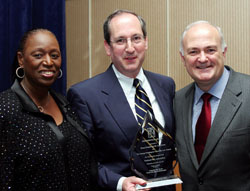
Associate Dean of Trial Advocacy Alfreda Robinson and GW President Steven Knapp congratulate Dean Frederick M. Lawrence, who received a civil rights award from the National Bar Association.
|

|
Dean Frederick M. Lawrence and GW Law School received the National Bar Association Presidential Award for Distinguished Service and Outstanding Sponsorship for Lawrence’s unwavering commitment to civil rights, civil liberties, and diversity. Lawrence, who is one of the nation’s leading civil rights experts, accepted the accolade during the Congressional Black Caucus Foundation’s Annual Legislative Conference at the Grand Hyatt Hotel on Sept. 26. More than 1,000 people attended the event, including at least 30 members of Congress, GW President Steven Knapp, and GW Law alumni and students. GW Law School was the only educational institution honored. Event chairwoman Alfreda Robinson, who is GW Law’s associate dean of trial advocacy, says the award brings great distinction to the Law School and its commitment to diversity. “As an associate dean and alumna of GW Law, I have enormous pride,” Robinson says. “It is a well-deserved achievement and one of the greatest awards that the University could obtain.”
|
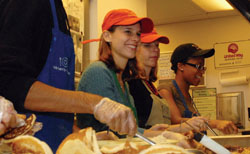
SBA Assistant Director of Community Service Caroline Lee and Director of Community Service Marcia McCree (from left, in the orange hats) joined other students to help feed the homeless.
|
Miriam’s Kitchen Service Project
The Student Bar Association Community Service Committee organized a volunteer service project for students to get involved in the Washington, D.C., community. Students woke up early on Oct. 30 to help serve hot meals to homeless neighbors at Foggy Bottom’s Miriam’s Kitchen. The SBA hosts several such initiatives every year. |
|